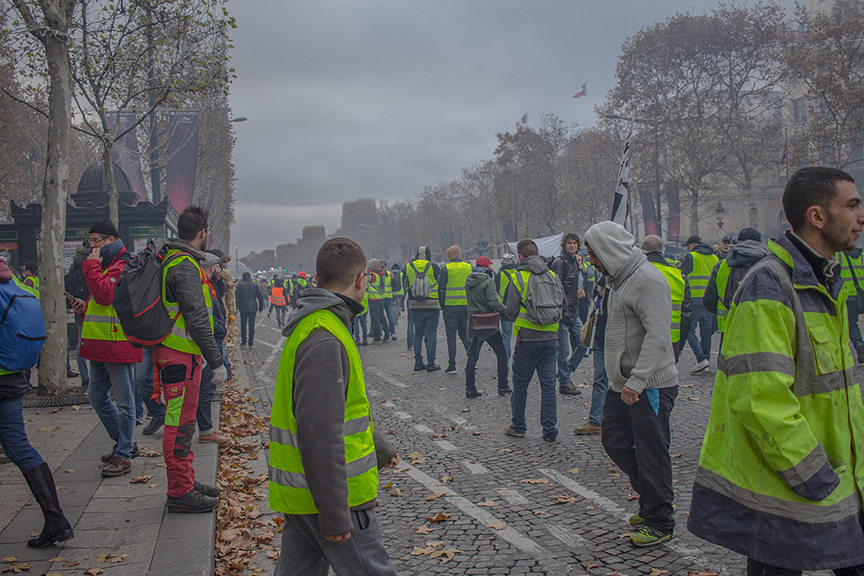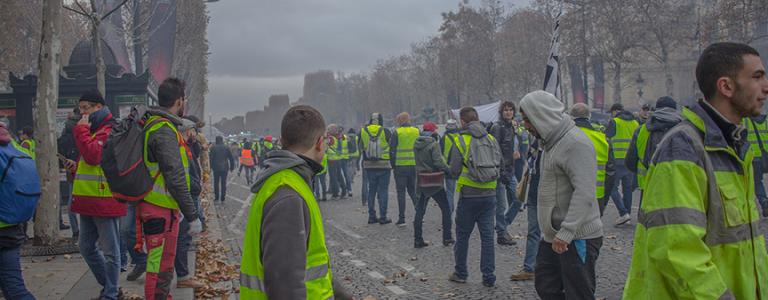The French Lesson on Climate Change Action
President Emmanuel Macron's failure to engage with the public on fuel price increases can backfire unless France follows Just Transition principles.
Energy transitions are about people.
The protests happening in France send that signal loud and clear. If green policies are seen to be unjust or to be worsening inequality they will not be accepted, regardless of a government's good intentions.
The government of President Emmanuel Macron violated two important principles of what is known as a "just energy transition": they failed to engage in social dialogue and they failed to formulate concrete benefits of the reform for those who are less privileged.

The good news is that when these principles are observed, reforms can and do succeed.
Take, for example, Ghana and Indonesia, countries which recently removed fuel subsidies. Governments there consulted with labor unions, consumer associations and other stakeholder groups while running communication campaigns explaining the reform's rationale and benefits.
In Canada, where the government is implementing another difficult reform – shutting down coal – the government launched a Task Force on Just Transition for Canadian Coal Power Workers and Communities. Made up of labour, industry, NGOs, academic and local government representatives, the task force is mandated to engage with relevant stakeholders, collect information on impacts, identify opportunities and feed recommendations back to the federal government.
The Straw that Broke the Camel's Back
In France, the "gilets jaunes" or Yellow Vests protests have been described as the biggest social unrest in decades. The riots are particularly jarring given that they arose in a country positioning itself as a world leader in terms of raising ambition and assuring the implementation of global climate change agreements.
The protesters were initially sparked by a fuel tax increase proposed to begin on Jan. 1, 2019. The discord, however, has been brewing over many other previously implemented or planned reforms by the Macron government such as partial abolition of the wealth tax, liberalization of the national rail and amendments to the labor code. Many of these are seen to contribute to rising inequality.
The fuel tax was designed to discourage people from using diesel cars and to raise revenue for funding renewables. Yet the protesters did not see concrete benefits for real people. Some of them even saw the tax as compromising the green agenda because a lion's share of fuel tax revenues would go to reduce France's fiscal deficit while the wealth tax was reduced.
As the protests grew increasingly violent, Macron canceled the tax increase. Prime Minister Edouard Philippe also announced a freeze on gas and electricity tariff rises and promised what should have happened in the first place: consultations across the country to see how reforms can be implemented without hitting vulnerable groups and how the green agenda can be matched with social needs.
Real Benefits for Real People
To enjoy broad-based support, green policies such as carbon and fuel taxes need to create visible benefits for vulnerable groups and reduce inequality. In Canada, the federal government plans to redistribute the proceeds of their carbon taxes to households as a form of carbon dividend. In Indonesia, when fuel subsidies were removed in 2015, $15.6 billion worth of savings were invested in social safety nets, infrastructure and transfers to villages. In France, the visible benefits of reduced diesel use will be better air quality and fewer respiratory diseases, but there hasn't been clear government communication on this point.
Job creation is another critical area for investing fuel tax revenues, and some of these ideas are already taking root in France. One was included in the protesters' counter-proposal for green policies as they urged the government to "favor ecology while saving households money" by carrying out a national plan to insulate buildings. On top of increasing energy efficiency, such programs also create local jobs.
The just transition is a headline issue at the U.N. climate conference currently taking place in Poland. There, the agenda focuses predominantly on workers, particularly in the coal industry. What is clear is that a just transition is needed not just for coal workers, but also for consumers. If social dialogue and concrete benefits for vulnerable groups are made central to climate policies, reforms will succeed.
Ivetta Gerasimchuk is lead for sustainable energy supplies, based in Geneva. Joachim Roth is energy policy consultant, based in Paris. Both work at the International Institute for Sustainable Development.
This article first appeared in U.S. News on December 7, 2018.
You might also be interested in
Doubling Back and Doubling Down: G20 scorecard on fossil fuel funding
This study tracks, for the first time, each G20 country's progress on ending support for fossil fuels—ranking their transparency, commitments, and financial support to oil, gas, and coal.
At long last, Canada restricts oil and gas subsidies (except for all the loopholes)
Environment and Climate Minister Steven Guilbeault has unveiled detailed plans to phase out "inefficient" oil and gas subsidies, based on guidelines released yesterday morning that take effect immediately and are meant to fulfill a 14-year-old pledge by G20 countries.
Heatwaves to hit China once every 5 years as global extreme weather events multiply, study finds
Record-breaking heatwaves that have scorched North America, Europe and China are set to worsen in future unless the world stops burning fossil fuels, according to a study by the World Weather Attribution (WWA) academic initiative.
Canada to Cut Oil & Gas Subsidies
The Canadian federal government has implemented a framework to revoke subsidies for fossil fuels that are deemed inefficient. However, the framework lacks details on the specific subsidies to be eliminated and does not provide a dollar amount for the cuts. Canada, as the fourth-largest oil producer in the world, is the first country to comply with a 2009 pledge made by the Group of Twenty (G20) nations. The government plans to exempt oil and gas projects that have plans to reduce emissions and utilize carbon capture and storage (CCS) technology. Federal Environment Minister Steven Guilbeault stated that the objective is for federal support to be directed only towards projects that decarbonize the sector and result in significant greenhouse gas emissions reductions.
